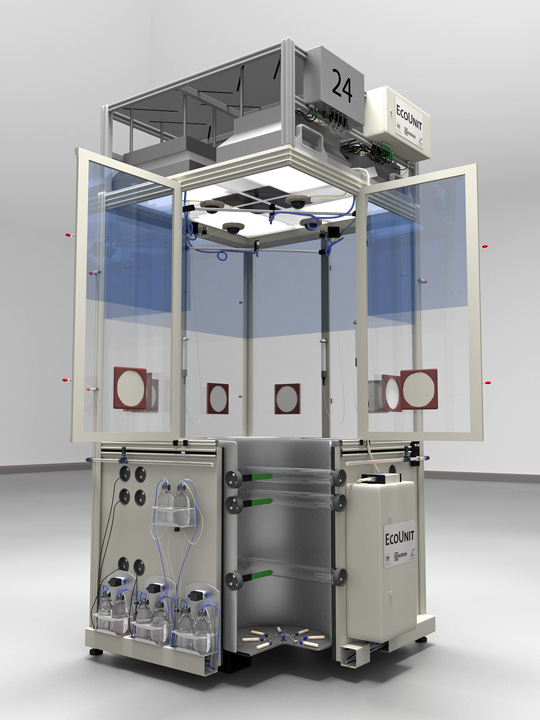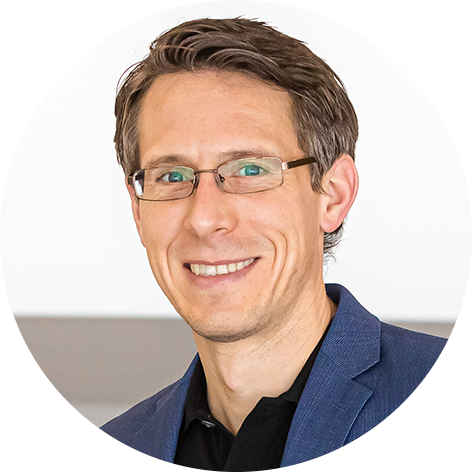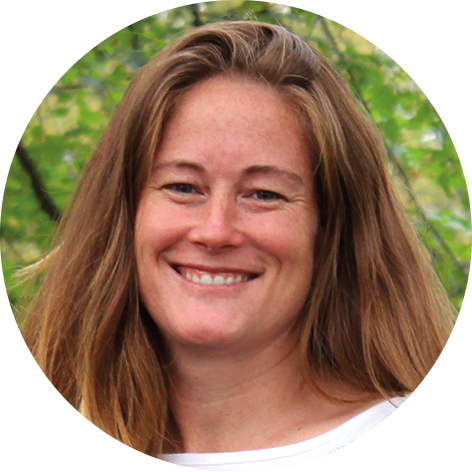The iDiv Ecotron is a joint research platform of the German Centre for Integrative Biodiversity Research (iDiv) Halle-Jena-Leipzig and the Helmholtz Centre for Environmental Research – UFZ.
The indoor research facility houses 24 identical experimental units, the so-called EcoUnits, each of which can contain one to four independent ecosystems, separated above- or belowground, or both. The faunal species composition within these ecosystems can be manipulated with respect to the number of species within a trophic level (horizontal diversity) as well as with respect to the number of trophic levels themselves (vertical diversity).
The main objective of the iDiv Ecotron is to manipulate multitrophic diversity in above-belowground food webs and study the consequences for many ecosystem functions.
By providing the unique opportunity to fully control environmental conditions like temperature, nutrient supply, and precipitation of each single ecosystem within the EcoUnits while measuring ecological processes with non-invasive methods, the iDiv Ecotron provides the link between laboratory and field studies as it combines the advantages of both.
Aims and Scope
The advantage of the iDiv Ecotron over laboratory and field studies lies in the combination of the ability to construct complex ecosystems under near-natural conditions (unlike laboratory studies) and at the same time to eliminate or reduce the variance of unknown factors by controlling environmental conditions (unlike field studies).
Therefore, the iDiv Ecotron offers the possibility to study ecological interactions of plants and invertebrates at multiple levels and on an adequate spatial scale, allowing a comprehensive investigation of multiple functions as well as the mechanisms underlying the relationship between biodiversity and ecosystem functioning.
Our main aims are:
- to study the impact of horizontal (i.e., diversity within trophic levels) and vertical diversity (i.e., the number of trophic levels – multidiversity) on ecosystem functioning
- to study the impact of the interactions of aboveground and belowground organisms and processes on ecosystem functioning
- to study the impact of the interactions of multidiversity and global change drivers on ecosystem functioning
Setup and Design


EcoUnits are experimental chambers comprising a bottom part (“below-ground part”), an upper part (“above-ground part”), and a technical part on the top.
The upper part is equipped with lighting, ventilation, irrigation installations, and the control cabinet.
The above-ground part provides sufficient space for the growth of herbaceous plants and tree saplings. It creates the preconditions for developing complex interaction networks of plants and a wide range of invertebrates.
The below-ground part can be filled with up to 1.23 m3 of soil or alternatively can be equipped with four steel cylinders (lysimeters of 0.5 m in diameter) each holding 0.16 m3 of soil.
The EcoUnits can be divided into four belowground compartments using the lysimeters and into four equally sized aboveground segments using mobile interior walls. Each EcoUnit can thus be separated above- or below-ground, or both, creating four separated chambers between which organisms and materials cannot exchange.
Each quarter has its own lighting, irrigation, and ventilation system as well as permanent measurement equipment. In this way, up to four different treatments can be implemented in each EcoUnit. With the lysimeters, it is possible to excavate intact soil monoliths directly from the field, which then provide a natural, undisturbed ecosystem for belowground organisms.
Virtual Visit
You are currently viewing a placeholder content from YouTube. To access the actual content, click the button below. Please note that doing so will share data with third-party providers.
More InformationContact


Prof Dr Nico Eisenhauer
Principal Investigator
Email: nico.eisenhauer@idiv.de


Dr Jes Hines
Scientific Coordinator
Email: jessica.hines@idiv.de
Alban Gebler
Technician
Phone: +49 341 9733191
Email: alban.gebler@idiv.de

